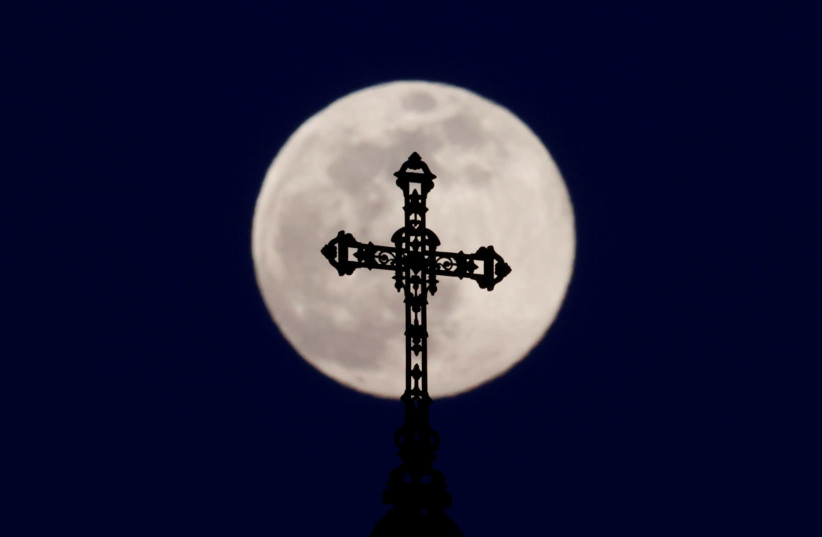“Why would anyone want to read a book about messianism? After all, the subject is abstruse and irrelevant to most people’s concerns,” Arnold Slyper asks in his prologue to The Struggle for Utopia.
“This book will attempt to show that the very opposite is true,” he continues. “Judaism, Christianity, and Islam are messianic religions and their messianic goals have profoundly shaped, and continue to shape, the lives of individuals and the direction of the world we live in.”
It is fair to say that the author has achieved his goal with this comprehensive, well-organized, and highly readable explanation of the three messianic traditions, which Slyper defines as “belief that a utopian existence will be created by miraculous or nonmiraculous means under the sovereignty of God, with or without the involvement of a messianic-like figure.”
He shows how the concept of a utopian society was developed by the Torah and evolved into a messianic ideal that was later adopted and adapted by Christianity and Islam.
How had messianism evolved throughout history?
Messianism in its various permutations was driven by personalities whom today we might call “influencers.” Among those singled out by Slyper are Abraham, Moses, several prophets, Rabbi Akiva, Maimonides, Nachmanides, the Vilna Gaon, and Rav A.Y. Kook (in Judaism); John the Baptist, Jesus of Nazareth, and Paul of Tarsus (in Christianity); and Muhammad and Jerusalem Mufti Amin al-Husseini (in Islam).

Slyper argues cogently that much of the world’s historic and current attitude toward Jews and Israel – love us or hate us – has been affected by messianic beliefs, which he explains in depth.
The prophet Isaiah “had the most influence on the Jewish concept of messianism and, via Judaism, on that of Christianity and Islam,” writes Slyper.
“He prophesied that a time will come when the omnipotence of God will be fully revealed to all mankind, and a utopian existence will be created on earth. This period will subsequently be called the messianic age. He wrote that in this messianic age, the righteousness and justice of the Jewish people will become a light unto the nations.”
Regarding Christianity, Slyper writes that Paul “developed doctrines more appealing to the gentile world. To do this, he directed the messianism of his new religion towards a spiritual, rather than earthly World to Come and dispensed with most of the laws of Judaism.” He points out that the Book of Revelation gave rise to varying approaches to eschatology and messianism that continue to influence Christian attitudes toward Jews and Israel.
As for Muslims, Slyper writes, “Iran, Hezbollah, and Hamas hold apocalyptic beliefs and regard the murder of Jews and elimination of Israel as a prelude to the Day of Judgment and World to Come. ISIS and al-Qaeda believe in creating an Islamic caliphate at the expense of global stability. Neither Hamas nor the Palestinian Authority is able to make an end of the conflict agreement with Israel because of its messianic beliefs.”
The last of the 17 chapters, “The Messianic Struggle for the Temple Mount,” predicts that “Muslims will never agree voluntarily to share the Temple Mount. The eschatological aims of Judaism and Islam on the Temple Mount are in total conflict with each other.”
While the book provides an equally glorious and frightening picture of the messianic forces driving geopolitics and global conflict, it’s much more than a treatise on messianism.
The Struggle for Utopia is also a thorough primer for Jews and non-Jews seeking to understand the foundational stories and core theologies underpinning Judaism, Christianity, and Islam.
For the most part, these sections serve to explicate the book’s central theme, although one chapter in particular (“The Exodus from Egypt and Canaanite Conquest – Facts or Fiction?”), while fascinating, seemed to me like an unnecessary detour.
In the course of presenting the roots of the three monotheistic faiths, Slyper examines the complicated relationship among their followers in antiquity and today and delves into messianism-related topics such as redemption, death, resurrection, jihad, apocalypse, and even Zionism. Theodor Herzl’s Altneuland was, after all, a novel about a Jewish utopia; and Rav Kook “equated Zionism allegorically with the Messiah ben Joseph.”
Kook, he notes, “believed that humanity would be redeemed through the spiritual heights the Jewish people would achieve, and through the harmony they would create in the human and cosmic planes.”
A retired physician and active hiker and history buff, Slyper is not waiting passively for this ideal to happen; he has started a Facebook forum, “Jewish, Christian and Islamic Messianism Scholarship,” with the ambitious vision of “a utopian world of peace where people of all faiths can coexist without fear of damnation in hell, conversion or annihilation.”
It’s safe to assume that we all yearn for a better future free of conflict and hatred; therefore, The Struggle for Utopia is a worthy reference to have on hand in any home or academic library.
The Struggle for Utopia: A History of Jewish, Christian and Islamic Messianism
By Dr. Arnold Slyper
Kochav Press
368 pages; $30.
